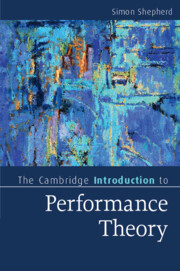Book contents
- Frontmatter
- Contents
- Preface
- Part I Definitions of performance
- Part II The emergence of performance as sensuous practice
- 6 Situationism, games and subversion
- 7 Hippies and expressive play
- 8 Performance as a new pedagogy
- 9 Architecture and the performed city
- 10 New forms of activism
- 11 Happenings and everyday performance
- 12 Body art and feminism
- 13 The arrival of Performance Art and Live Art
- 14 Dance party politics
- Part III Theorising performance
- Closing note
- References
- Index
- Cambridge Introductions to …
7 - Hippies and expressive play
from Part II - The emergence of performance as sensuous practice
Published online by Cambridge University Press: 05 February 2016
- Frontmatter
- Contents
- Preface
- Part I Definitions of performance
- Part II The emergence of performance as sensuous practice
- 6 Situationism, games and subversion
- 7 Hippies and expressive play
- 8 Performance as a new pedagogy
- 9 Architecture and the performed city
- 10 New forms of activism
- 11 Happenings and everyday performance
- 12 Body art and feminism
- 13 The arrival of Performance Art and Live Art
- 14 Dance party politics
- Part III Theorising performance
- Closing note
- References
- Index
- Cambridge Introductions to …
Summary
When the midnight crowd in Amsterdam were chanting ‘image image’ around Grootveld they were celebrating the revelation of, and attack on, the workings of the spectacle. And, when the Provos set about provoking the Dutch state to reveal the brutality behind the civilly organised commodity relationships, there was, again, an echo of the Situationists. The echoes were reverberating further afield. In Strasbourg a newly elected student union executive blew its entire budget in 1966 on printing a situationist pamphlet which had a significant set of words in its title: On the Poverty of Student Life: Considered in Its Economic, Political, Psychological, Sexual, and Particularly Intellectual Aspects, and a Modest Proposal for Its Remedy (discussed in Home 1991: 45; translations vary). The Strasbourg students were not alone. Student unrest was spreading across western Europe. And even as they watched it contemporary commentators became aware of a similar attitude to dominant order expressing itself, albeit in a somewhat different way, on the other side of the Atlantic. And just as was happening in European thinking there were new ideas about the thing that would end up being called performance.
It is 1967, in Haight-Ashbury in San Francisco:
Two youths seat themselves on the sidewalk or in a store entranceway; bent beer can in hand, one begins scratching a bongo-like rhythm on the pavement while the other tattoos a bell-like accompaniment by striking a stick on an empty bottle. Soon they are joined, one by one, by a tambourinist, a harmonica player, a penny-whistler or recorder player, and, of course, the ubiquitous guitarist. A small crowd collects and, at the fringes, some blanket-bedeckt boys and girls begin twirling about in movements vaguely resembling a Hindu dance. The wailing, rhythmic beating and dancing, alternately rising to peaks of intensity and subsiding, may last for as little as five minutes or as long as an hour, players and dancers joining in and dropping out as whim moves them. At some point – almost any – a mood takes hold that ‘the happening is over’; participants and onlookers disperse as casually as they had collected. (Davis 1970: 333–34)
An everyday event such as this typified the culture of the young people who gathered in Haight-Ashbury in the late 1960s, the hippies. Their culture very quickly attracted the attention of social commentators such as Fred Davis, …
- Type
- Chapter
- Information
- The Cambridge Introduction to Performance Theory , pp. 68 - 75Publisher: Cambridge University PressPrint publication year: 2016



